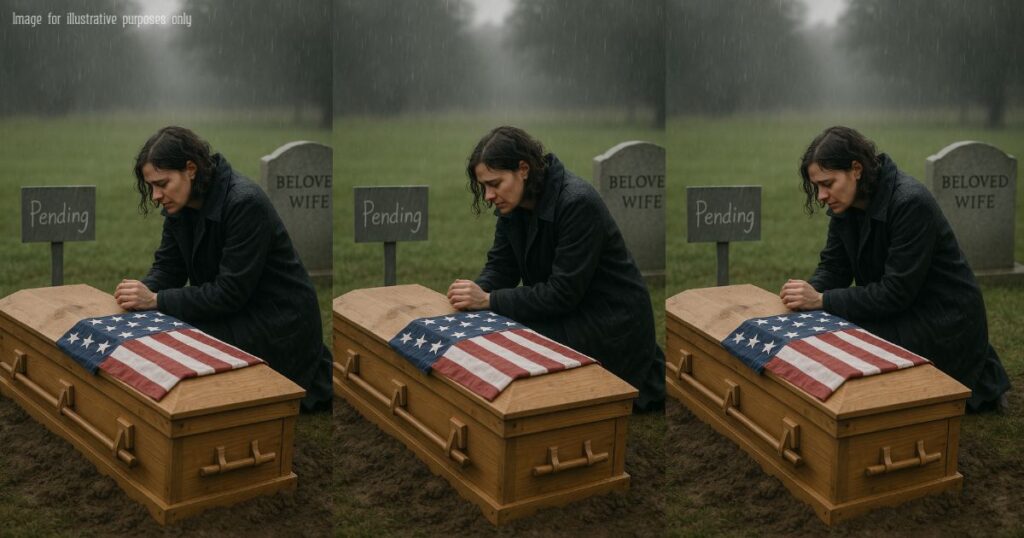“They folded that flag like it meant something—but forgot him two months later.”
That was the day I stopped saluting the flag.
Don’t get me wrong—Daddy raised me to respect it. Every Fourth of July, we’d stand out by the flagpole he cemented into our front yard, hand over heart, the nylon snapping in the summer wind. He’d wear his old Army cap, even if it was hot. Said it reminded him who he used to be.
He never talked much about Vietnam, not the real stuff. I’d ask when I was little—too little to understand—and he’d just ruffle my hair and say, “Some stories ain’t bedtime ones, pumpkin.”
But I saw the way he jumped when a car backfired. The way he locked the doors three times at night. The way his knuckles turned white when he gripped the steering wheel too long. There were nights he’d sit out in the truck, motor off, cigarette glowing, staring into the dark.
Still, he went to work every day. Thirty-six years at the steel mill, back when a man could put in a day’s work and raise a family without needing a handout. Mama packed his lunch in an old tin box. Bologna sandwich. Thermos of black coffee. Same thing every morning at 5:10.
He had scars we never asked about and medals he never showed off. Said they were “just brass reminders of things I wish I could forget.”
When the plant shut down, it broke something in him. He didn’t say much, just lined up with the rest of the men for their pink slips, like cattle to the gate. They offered a handshake and a pocket watch. The kind of watch that stops ticking two weeks in, just like the benefits did.
Mama passed three years later. Stroke. Fast and mean. Daddy just stood in the hospital room like a statue carved from the old world—stoic, silent, unmoved. But when we got home, he sat on her side of the bed and didn’t move for hours.
That’s when the VA visits started. Once every few weeks, then once a month when they told him the clinic was “at capacity.” His back hurt so bad he couldn’t sleep, and the arthritis in his hands meant he couldn’t hold a fork steady. But he wouldn’t complain. That’s not what soldiers did.
We did the paperwork.
So many forms. Form 10-10EZ. Form 21-526. Proof of service. Proof of marriage. Proof of income. Proof he existed.
He’d served his country, bled for it, buried friends for it—but now they needed copies of everything short of his soul.
He’d sit at the kitchen table with all those papers, eyes squinting under the kitchen light, hands shaking too hard to sign. I started forging his signature. He didn’t stop me. He just looked at the wall behind me and whispered, “This ain’t what they promised us.”
Then came the chest pains.
He waited too long, said it was just gas. But I knew. I’d been watching him fade for months—like a photograph left too long in the sun. The VA took three days to return my call. By the time we got the appointment, he was already gone.
I sat beside his hospital bed the morning they folded the flag.
Three sharp creases. White gloves. Salutes. Words said with no eyes meeting mine.
“On behalf of a grateful nation…”
I wanted to scream. Grateful? They forgot him while he was still breathing.
I took the flag, yes. Folded triangle. Stiff. Smelled like starch and empty promises.
But I didn’t take their condolences. I buried him next to Mama in a cheap wooden box because the VA headstone paperwork was still “in process.”
He’d given everything—his youth, his sleep, his spine—and in the end, he got one cleanly folded piece of fabric and a letter I had to request twice.
That first Christmas without him, I found one of his old cassette tapes—him singing to Mama back in ‘85, guitar in hand, creaky voice full of love and Marlboros. I played it until it snapped.
Now I sit on the porch he built with his bare hands.
The flagpole’s still there, but the flag doesn’t fly anymore.
Not because I hate this country. No. Because Daddy didn’t die for a flag—he lived for his family, his brothers-in-arms, and the hope that when it was his turn to need help, someone would show up.
They didn’t.
But I do. I speak his name every day. I volunteer at the VFW now, filing forms for men with the same hands, same eyes, same ghosts. I teach their daughters how to make noise when the system gets quiet.
I make sure nobody forgets.
And sometimes, when the porch light’s just right, I can almost see him out by the truck again—cigarette glowing, eyes tired but steady.
They folded the flag too fast. But I’m still unfolding his story.
Let that mean something.
I got the call on a Tuesday.
Some kid at the VA, voice shaking like I’d scared him just by answering.
“There’s been… a mix-up,” he said.
My heart sank. I’d heard that phrase too many times—always just before bad news.
This time, it was worse than usual.
“We found a box… with your father’s belongings. It was supposed to be mailed out months ago.”
Pause.
“It never left the warehouse.”
I didn’t speak. Just stared out at the empty flagpole, the wind spinning the rope like a noose.
“There’s a cassette tape in there,” he added, “and a note. Addressed to you.”
👉 “But what was on that tape? And why didn’t I know he’d left a message?”


